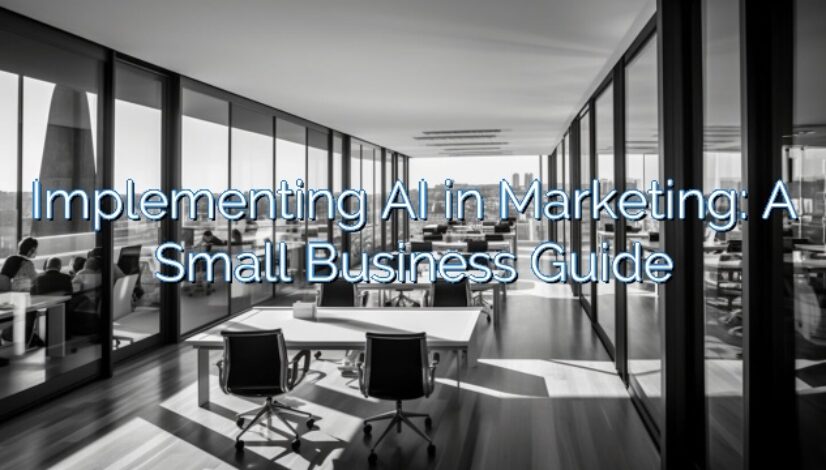Implementing AI in Marketing: A Small Business Guide
In the ever-evolving world of marketing, staying ahead of the competition is crucial for small businesses. One groundbreaking tool that has emerged is Artificial Intelligence (AI). By leveraging AI technology, businesses can unlock a plethora of advantages, from enhanced customer segmentation to personalized marketing strategies. This comprehensive guide aims to empower small businesses with the knowledge and insights necessary to successfully implement AI in their marketing efforts. Join us as we explore the transformative possibilities AI offers to propel your business to new heights of success.
Key Takeaways
- AI in marketing offers benefits such as automated email campaigns, prediction of consumer behavior, optimization of advertising campaigns, enhanced customer engagement, and cost savings for small businesses.
- AI-powered customer segmentation allows for the division of the customer base into distinct groups based on characteristics, automation of customer segmentation, time and resource savings, predictive analytics, and more accurate customer segments for personalized campaigns.
- Personalized marketing with AI includes AI-powered recommendations, personalized email content, time and effort savings through automation, enhanced customer experience, and increased likelihood of conversions and customer loyalty.
- AI-driven content creation and optimization involves AI-driven copywriting tools, AI-powered SEO techniques, insights from AI algorithms, personalized content recommendations, and increased online visibility and organic traffic to the website.
Benefits of AI in Marketing
The implementation of AI in marketing offers numerous quantifiable benefits to small businesses. One of the key advantages is the ability to create automated email campaigns. AI algorithms can analyze consumer data and behavior, allowing businesses to send personalized emails at scale. By leveraging AI, small businesses can optimize their email marketing efforts, resulting in higher open rates, click-through rates, and conversions.
Another benefit of AI in marketing is the ability to predict consumer behavior. AI algorithms can analyze vast amounts of data from various sources, such as social media, website interactions, and purchase history, to identify patterns and trends. This predictive analysis helps small businesses understand their target audience better and tailor their marketing strategies accordingly. By anticipating consumer needs and preferences, businesses can deliver targeted advertisements, personalized recommendations, and relevant content, resulting in improved customer engagement and satisfaction.
Furthermore, AI can help small businesses optimize their advertising campaigns. AI-powered tools can analyze data in real-time, allowing businesses to make data-driven decisions regarding ad placement, targeting, and messaging. This automation and optimization of advertising efforts can lead to higher ROI and cost savings for small businesses.
AI-powered Customer Segmentation
An effective way to leverage AI in marketing is through AI-powered customer segmentation. Customer segmentation involves dividing a company’s customer base into distinct groups based on characteristics such as demographics, purchasing behavior, and preferences. This allows businesses to tailor their marketing efforts to specific customer segments, resulting in more targeted and personalized campaigns.
AI-powered customer segmentation takes this concept a step further by automating the process using advanced algorithms and predictive analytics. By analyzing large amounts of customer data, AI can identify patterns and trends that humans may overlook. This enables businesses to better understand their customers and create more accurate customer segments.
Automated targeting is a key benefit of AI-powered customer segmentation. Instead of manually segmenting customers, AI algorithms can automatically identify the most relevant segments for a particular marketing campaign. This saves time and resources, allowing marketers to focus on crafting compelling messages that resonate with their target audience.
Predictive analytics is another valuable aspect of AI-powered customer segmentation. By analyzing historical data, AI algorithms can predict future customer behavior and preferences. This enables businesses to anticipate customer needs and proactively engage with them, leading to increased customer satisfaction and loyalty.
Personalized Marketing With AI
AI-powered personalized marketing is a powerful strategy for small businesses to enhance customer engagement and drive conversions. By leveraging AI technologies, businesses can deliver tailored experiences to their customers, increasing the likelihood of conversions and building long-lasting relationships.
One of the key ways AI can enable personalized marketing is through AI-powered recommendations. By analyzing customer data and behavior, AI algorithms can suggest relevant products or services to individual customers, increasing the chances of making a sale. This not only improves the customer experience but also helps businesses optimize their marketing efforts.
Another area where AI can make a significant impact is in AI-driven email campaigns. AI can analyze customer preferences and behaviors to create personalized email content, increasing open rates and click-through rates. AI can also automate the process of sending personalized emails to different customer segments, saving time and effort for small businesses.
In the next section, we will explore how AI can be used for AI-driven content creation and optimization, further enhancing the effectiveness of marketing campaigns. AI-powered personalized marketing is a game-changer for small businesses, allowing them to compete with larger enterprises by delivering targeted and relevant experiences to their customers.
AI-driven Content Creation and Optimization
To further enhance marketing campaigns, small businesses can leverage AI to create and optimize content for their target audience. AI-driven copywriting tools can generate high-quality content that resonates with customers, saving time and resources. These tools use natural language processing and machine learning algorithms to analyze data and produce compelling copy that aligns with the brand’s voice and style.
AI-powered SEO is another area where small businesses can benefit. With the help of AI, businesses can optimize their website content and improve their search engine rankings. AI algorithms can analyze keyword trends, competitor strategies, and user behavior to provide valuable insights for content optimization. By implementing AI-powered SEO techniques, businesses can increase their online visibility and attract more organic traffic to their website.
Furthermore, AI can also assist in content personalization. By analyzing user data and behavior, AI algorithms can deliver personalized content recommendations to individual customers. This level of personalization enhances the customer experience and increases engagement, ultimately leading to higher conversion rates and customer satisfaction.
AI Chatbots for Customer Support
Small businesses can seamlessly integrate AI chatbots into their customer support systems, enhancing their ability to provide efficient and personalized assistance to customers. AI chatbots have become a game-changer in the field of customer support, offering numerous benefits for small businesses.
Here are three ways AI chatbots can benefit small businesses in their customer support efforts:
- AI chatbots for lead generation: By using AI chatbots, small businesses can capture valuable customer information and generate leads effectively. These chatbots can engage with potential customers, ask relevant questions, and collect data that can be used for targeted marketing campaigns.
- AI chatbots for sales conversion: AI chatbots can assist customers in making purchasing decisions by providing real-time product recommendations, answering product-related questions, and offering personalized deals. This personalized approach can significantly increase sales conversion rates for small businesses.
- AI chatbots for 24/7 support: Small businesses often struggle to provide round-the-clock customer support due to limited resources. AI chatbots can overcome this challenge by providing instant and consistent support to customers anytime, anywhere. This ensures that customers receive prompt assistance, leading to improved customer satisfaction and loyalty.
How Can AI Implementation in Marketing Drive SMB Growth and Expansion?
AI implementation in marketing empowers small businesses to streamline processes, enhance customer personalization, and boost ROI. By leveraging predictive analytics, automation, and data-driven insights, AI equips SMBs to compete effectively with larger players. Adopting ai for smb growth provides scalable solutions that drive customer engagement, reduce costs, and fuel sustainable expansion.
Frequently Asked Questions
How Can AI Help Small Businesses in Improving Customer Engagement and Loyalty?
AI can greatly assist small businesses in enhancing customer engagement and loyalty through various means. AI driven personalization allows businesses to tailor their marketing efforts to individual customers, delivering personalized experiences and recommendations. Additionally, AI powered recommendation systems can analyze customer data to suggest relevant products and services, increasing customer satisfaction and loyalty. By leveraging AI technology, small businesses can create more targeted and personalized marketing strategies, leading to improved customer engagement and loyalty.
What Are Some Potential Challenges and Risks Associated With Implementing AI in Marketing for Small Businesses?
Implementing AI in marketing for small businesses can present several challenges and risks. One challenge is the initial cost of implementing AI technology, which may be prohibitive for small businesses with limited resources. Another challenge is the need for skilled professionals to manage and optimize AI systems, which may be difficult to find and afford. Additionally, there are risks associated with data privacy and security, as AI requires access to large amounts of customer data. These challenges and risks should be carefully considered before implementing AI in small business marketing strategies.
Are There Any Ethical Concerns Related to Using Ai-Powered Customer Segmentation in Marketing Strategies?
Ethical considerations and privacy concerns are indeed associated with using AI-powered customer segmentation in marketing strategies. While AI can greatly enhance targeting and personalization, there is a risk of crossing ethical boundaries by collecting and using customer data without proper consent. Additionally, there is a potential for discriminatory outcomes if AI algorithms are biased or not properly calibrated. It is crucial for businesses to prioritize transparency, informed consent, and fairness to ensure ethical use of AI in marketing.
Can Ai-Driven Content Creation and Optimization Help Small Businesses in Improving Their Search Engine Rankings?
AI-driven content creation and optimization can greatly benefit small businesses in improving their search engine rankings. By utilizing AI algorithms, businesses can create high-quality and relevant content that appeals to both search engines and users. AI can analyze data and user behavior to identify keywords and trends, helping businesses optimize their website and increase visibility on search engine result pages. Additionally, AI-powered tools can automate email marketing campaigns, personalizing content and improving engagement with customers. Overall, AI offers small businesses valuable insights and tools to enhance their online presence and drive organic traffic.
How Can AI Chatbots for Customer Support Be Integrated With Existing Customer Service Platforms and Tools?
Integrating chatbots into existing customer service platforms and tools can offer numerous benefits for businesses. AI chatbots can provide 24/7 support, answer frequently asked questions, and handle basic customer inquiries, freeing up human agents to focus on more complex issues. However, implementing AI chatbots may come with challenges such as ensuring seamless integration with existing systems, training the chatbots with accurate and up-to-date information, and maintaining a personalized customer experience. Overcoming these challenges is crucial for successful AI chatbot implementation.
Conclusion
In conclusion, implementing AI in marketing can bring numerous benefits to small businesses. By leveraging AI-powered customer segmentation, personalized marketing strategies can be developed to effectively target specific customer groups. AI-driven content creation and optimization can help businesses create engaging and relevant content, while AI chatbots can provide efficient customer support. With the potential to streamline processes, enhance customer experiences, and drive business growth, AI is a valuable tool for small businesses in the ever-evolving marketing landscape. Can small businesses afford to ignore the opportunities AI brings?




